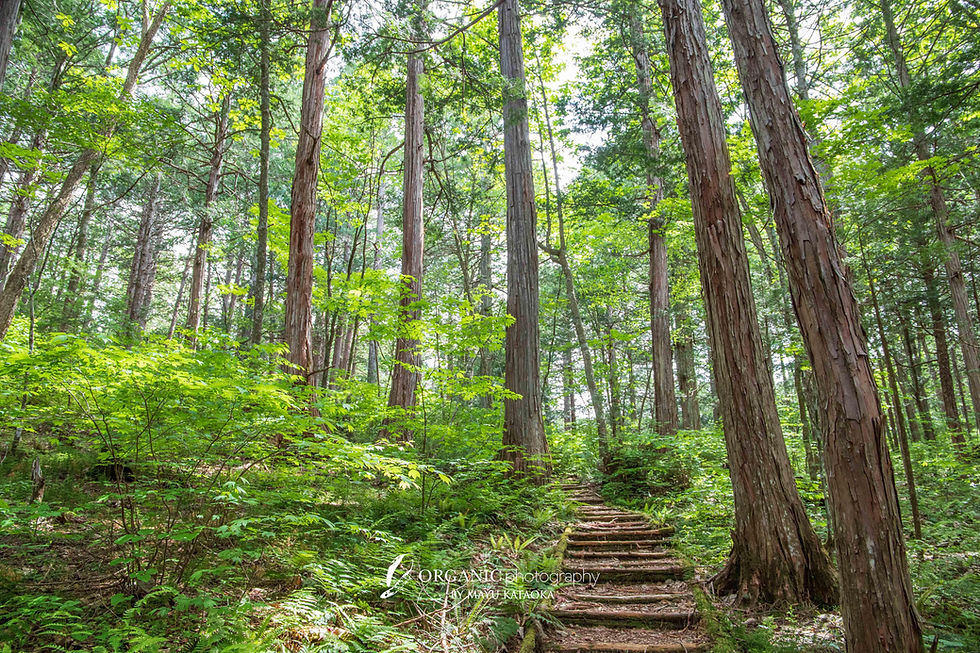The Science Behind Forest Therapy : Research and Evidence on Shinrin-yoku
- Mayu Kataoka

- Aug 14, 2023
- 3 min read

The practice of Shinrin-yoku has been supported by a wealth of scientific research, uncovering the profound health benefits that spending time in nature can offer. In this blog, we explore the science behind forest therapy and the evidence that supports its positive impact on our overall health.
The Power of Phytoncides
When we walk through a forest, we breathe in more than just fresh air; we inhale phytoncides. These are volatile organic compounds released by trees and plants as a defense mechanism against insects or fungus attack. This unique scent is known as the aroma of the forest. In Australia, we have a beautiful scent of Eucalyptus and native flowers. In Japan, we have a beautiful scent of Japanese Hinoki, Cedar and Cypress trees.
Phytoncides are Anti-bacterial, Anti-fungal, Anti-inflammatory, Anti-viral, Anti-microbial.

(Eucalyptus forest - Sydney, Australia)

(Hinoki forest at Akasawa Natural Recreation Forest in Kiso, Nagano, Japan)
Research has shown that phytoncides have significant physiological effects on our bodies. When inhaled, they stimulate our immune system, increase the production of natural killer (NK) cells, and enhance the activity of anti-cancer proteins. A study conducted in Japan found that a two-hour forest walk significantly increased the number of NK cells and their activity for up to a week, illustrating the long-lasting benefits of Shinrin-yoku.
Stress Reduction and Cortisol Levels
In our modern lives, stress has become a common and detrimental factor affecting our health. Fortunately, forest therapy has been found to be a powerful stress-reduction technique. A study from the University of Chiba in Japan discovered that participants who engaged in Shinrin-yoku experienced lower levels of cortisol, a stress hormone. Spending time in nature induces a state of relaxation and tranquility, allowing the body to recover from the physiological and psychological effects of chronic stress. The calming effect of the forest environment also reduces heart rate and blood pressure, promoting cardiovascular health.
Enhanced Mental Clarity and Creativity
Beyond its physical benefits, Shinrin-yoku has a positive impact on our cognitive abilities as well. Researchers at the University of Michigan found that taking a nature walk enhanced attention and working memory performance by 20%. Moreover, spending time in nature has been linked to increased creativity and problem-solving skills. Nature's calming influence helps clear the mind, making room for innovative thinking and mental clarity.

Boosted Mood and Reduced Anxiety
Many people experience an improvement in mood after spending time in nature, and the research backs up this observation. A study published in the Journal of Affective Disorders revealed that walking in the forest led to a decrease in anxiety and depression symptoms. The combination of the peaceful surroundings, natural beauty, and the therapeutic effects of phytoncides contribute to an uplifted mood and a sense of well-being.
Strengthened Immune System
Regular practice of Shinrin-yoku has been associated with a strengthened immune system, making us more resilient to illnesses. The increased activity of NK cells, as mentioned earlier, helps the body fight infections and potentially reduces the risk of various diseases.
Japanese Sushi Restaurant is a full of Phytoncides !

When you go to Sushi Restaurant, there is a glass case on the counter where the chef keeps raw fish (Sushi toppings). In the glass case, these toppings are preserved along with the conifer leaves of Japanese Hinoki/Cypress trees.
Hinoki/Cypress are also used as a serving plate, chopping board and counter table.
For take away, Sushi is wrapped with "Kyo-gi" which is a paper-like thinly shaved wood such as cedar and cypress because of its strong anti-bacterial effect.

(Kyo-gi)
(Left : Wrapping example Centre : Wrapping Onigiri (rice ball) Left : My lunch box is also made with Cedar tree)

As we delve deeper into the science behind forest therapy, it becomes evident that Shinrin-yoku is more than just a relaxing walk in the woods; it is a scientifically validated practice with numerous health benefits. The combination of phytoncides, stress reduction, improved cognitive function, mood enhancement, and immune system support makes forest therapy a holistic approach to well-being.
Incorporating Shinrin-yoku into our lives can lead to a profound transformation, nurturing our physical, mental, and emotional health, and fostering a deeper connection with the natural world. So, the next time you feel the weight of the world on your shoulders, consider taking a mindful stroll through the nearest forest and let the healing power of nature work its magic.










Comments